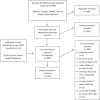The distinctive roles of urban community health workers in low- and middle-income countries: a scoping review of the literature
- PMID: 32494801
- PMCID: PMC7553762
- DOI: 10.1093/heapol/czaa049
The distinctive roles of urban community health workers in low- and middle-income countries: a scoping review of the literature
Abstract
Addressing urban health challenges in low- and middle-income countries (LMICs) has been hampered by lack of evidence on effective mechanisms for delivering health services to the poor. The urban disadvantaged experience poor health outcomes (often worse than rural counterparts) and face service barriers. While community health workers (CHWs) have been extensively employed in rural communities to address inequities, little attention has been given to understanding the roles of CHWs in urban contexts. This study is the first to systematically examine urban CHW roles in LMICs. It aims to understand their roles vis-à-vis other health providers and raise considerations for informing future scope of practice and service delivery models. We developed a framework that presents seven key roles performed by urban CHWs and position these roles against a continuum of technical to political functions. Our scoping review included publications from four databases (MEDLINE, EMBASE, CINAHL and Social Sciences Citation Index) and two CHW resource hubs. We included all peer-reviewed, CHW studies situated in urban/peri-urban, LMIC contexts. We identify roles (un)commonly performed by urban CHWs, present the range of evidence available on CHW effectiveness in performing each role and identify considerations for informing future roles. Of 856 articles, 160 met the inclusion criteria. Programmes spanned 34 LMICs. Studies most commonly reported evidence on CHWs roles related to health education, outreach and elements of direct service provision. We found little overlap in roles between CHWs and other providers, with some exceptions. Reported roles were biased towards home visiting and individual-capacity building, and not well-oriented to reach men/youth/working women, support community empowerment or link with social services. Urban-specific adaptations to roles, such as peer outreach to high-risk, stigmatized communities, were limited. Innovation in urban CHW roles and a better understanding of the unique opportunities presented by urban settings is needed to fully capitalize on their potential.
Keywords: Urban health; community health; health inequalities; human resources; low- and middle-income countries; review.
© The Author(s) 2020. Published by Oxford University Press in association with The London School of Hygiene and Tropical Medicine. All rights reserved. For permissions, please e-mail: journals.permissions@oup.com.
Figures
Similar articles
-
Changes in blood pressure among users of lay health worker or volunteer operated community-based blood pressure programs over time: a systematic review protocol.JBI Database System Rev Implement Rep. 2015 Oct;13(10):30-40. doi: 10.11124/jbisrir-2015-1927. JBI Database System Rev Implement Rep. 2015. PMID: 26571280
-
Community Health Worker Programs to Improve Healthcare Access and Equity: Are They Only Relevant to Low- and Middle-Income Countries?Int J Health Policy Manag. 2018 Oct 1;7(10):943-954. doi: 10.15171/ijhpm.2018.53. Int J Health Policy Manag. 2018. PMID: 30316247 Free PMC article.
-
Application of primary healthcare principles in national community health worker programmes in low-income and middle-income countries: a scoping review.BMJ Open. 2022 Feb 2;12(2):e051940. doi: 10.1136/bmjopen-2021-051940. BMJ Open. 2022. PMID: 35110314 Free PMC article.
-
Beyond the black stump: rapid reviews of health research issues affecting regional, rural and remote Australia.Med J Aust. 2020 Dec;213 Suppl 11:S3-S32.e1. doi: 10.5694/mja2.50881. Med J Aust. 2020. PMID: 33314144
-
Ongoing training of community health workers in low-income andmiddle-income countries: a systematic scoping review of the literature.BMJ Open. 2018 Apr 28;8(4):e021467. doi: 10.1136/bmjopen-2017-021467. BMJ Open. 2018. PMID: 29705769 Free PMC article.
Cited by
-
Community Mental Health Workers: Their Workplaces, Roles, and Impact.Community Ment Health J. 2024 Nov;60(8):1547-1556. doi: 10.1007/s10597-024-01306-2. Epub 2024 Jun 19. Community Ment Health J. 2024. PMID: 38896213 Review.
-
Development of a Digital Platform to Promote Mother and Child Health in Underserved Areas of a Lower-Middle-Income Country: Mixed Methods Formative Study.JMIRx Med. 2024 Jul 31;5:e48213. doi: 10.2196/48213. JMIRx Med. 2024. PMID: 39087559 Free PMC article.
-
How community medical facilities can promote resilient community constructions under the background of pandemics.Indoor Built Environ. 2022 Apr;31(4):1018-1027. doi: 10.1177/1420326X211048537. Indoor Built Environ. 2022. PMID: 35431637 Free PMC article.
-
Strengthening primary health care through community health workers in South Asia.Lancet Reg Health Southeast Asia. 2024 Aug 20;28:100463. doi: 10.1016/j.lansea.2024.100463. eCollection 2024 Sep. Lancet Reg Health Southeast Asia. 2024. PMID: 39301268 Free PMC article. Review.
-
Maternal and child surveillance in peri-urban communities: Perceptions of women and community health workers from Pakistan.PLOS Glob Public Health. 2022 Apr 26;2(4):e0000295. doi: 10.1371/journal.pgph.0000295. eCollection 2022. PLOS Glob Public Health. 2022. PMID: 36962403 Free PMC article.
References
-
- African Population and Health Research Center (APHRC). 2002. Population and Health Dynamics in Nairobi’s Informal Settlements: Report of the Nairobi Cross-Sectional Slums Survey (NCSS) 2000. Nairobi: African Population and Health Research Center (APHRC).
-
- Agarwal S, Srivastava A, Kumar S.. 2010. Urban health in developing countries In: Agarwal S, Srivastava A, Kumar S (eds). Perspectives of Knowledge Management in Urban Health New York, NY: Springer New York, 61–94.
-
- Agboatwalla M, Akram DS.. 1995. An experiment in primary health care in Karachi, Pakistan. Community Development Journal 30: 384–91. - PubMed
Publication types
MeSH terms
LinkOut - more resources
Full Text Sources
Miscellaneous



